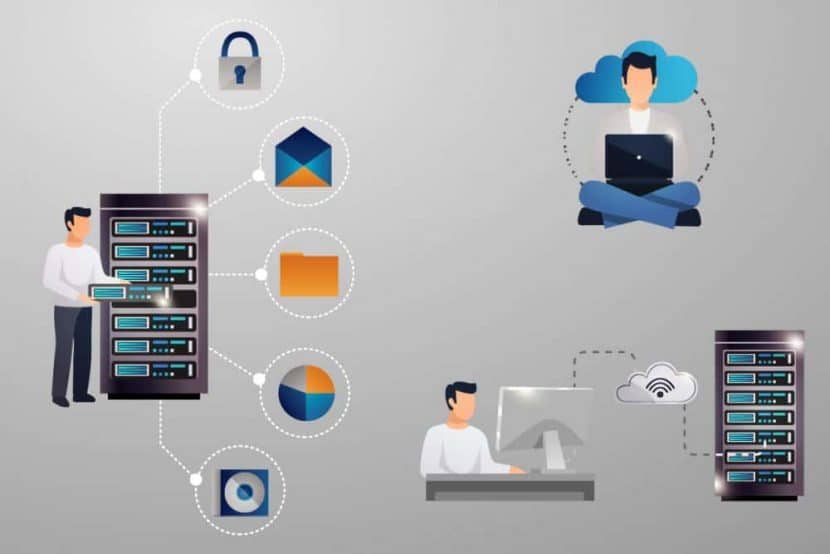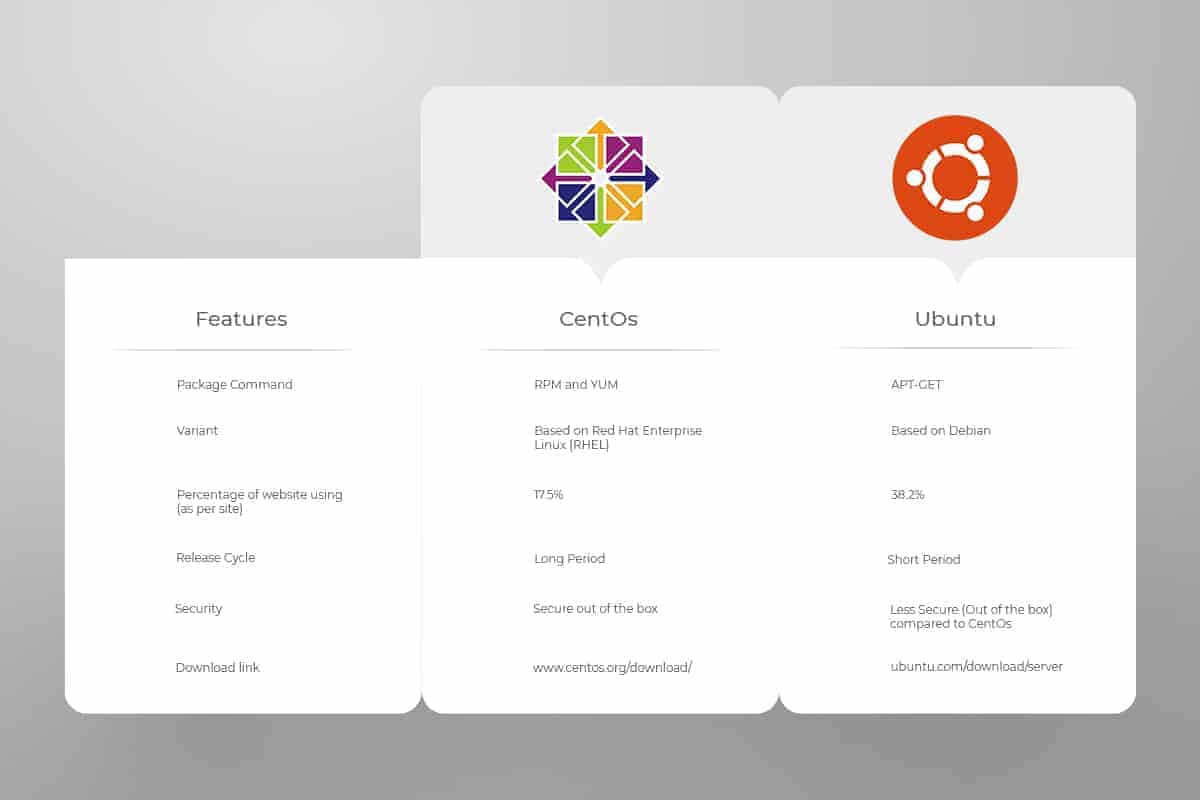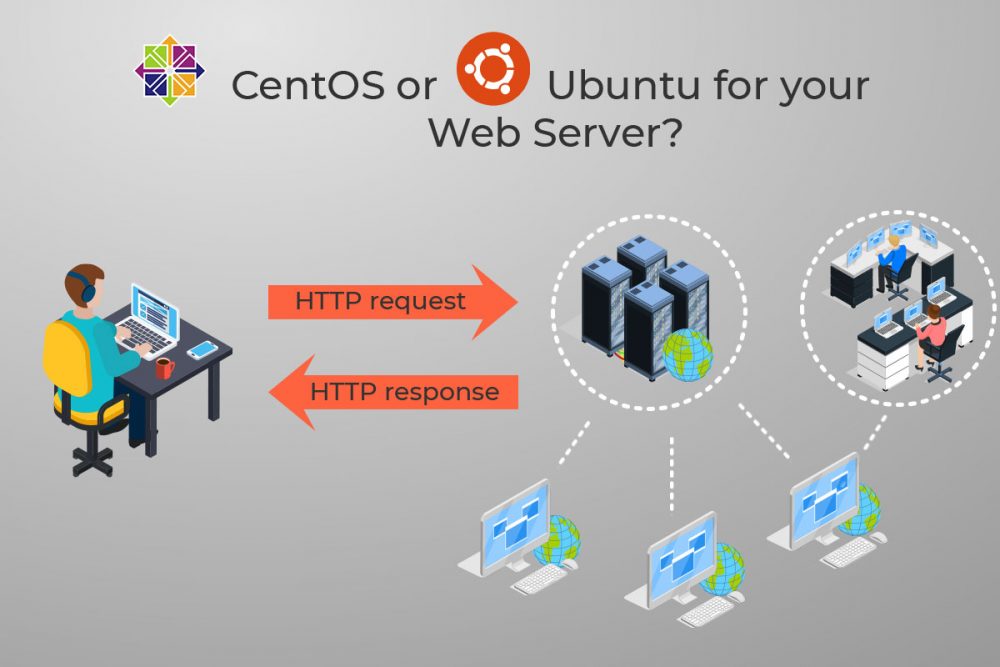Don’t know whether to use CentOS or Ubuntu for your server? Let’s compare both and decide which one you should use on your server/VPS. In highlighting the two principal Linux distributions’ strengths and weaknesses for running a web server, the choice should become clear.
Linux is an open-source operating system currently powering most of the Internet. There are hundreds of different versions of Linux. For web servers, the two most popular versions are Ubuntu and CentOS. Both are open-source and free community-supported operating systems. You’ll be happy to know these distributions have a ton of community support and, therefore, regularly available updates.
Unlike Windows, Linux’s open-source license and encourages users to experiment with the code. This flexibility has created loyal online communities dedicated to building and improving the core Linux operating system.
Quick Overview of Ubuntu and CentOS
Ubuntu
Ubuntu is a Linux distribution based on Debian Linux. The word Ubuntu comes from the Nguni Bantu language, and it generally means “I am what I am because of who we all are.” It represents Ubuntu’s guiding philosophy of helping people come together in the community. Canonical, the Ubuntu developers, sought to make a Linux OS that was easy to use and had excellent community support.
Ubuntu boasts a robust application repository. It is updated frequently and is designed to be intuitive and easy to use. It is also highly customizable, from the graphical interface down to web server packages and internet security.
CentOS
CentOS is a Linux distribution based on Red Hat Enterprise Linux (RHEL). The name CentOS is an acronym for Community Enterprise Operating System. Red Hat Linux has been a stable and reliable distribution since the early days of Linux. It’s been mostly implemented in high-end corporate IT applications. CentOS continues the tradition started by Red Hat, providing an extremely stable and thoroughly-tested operating system.
Like Ubuntu, CentOS is highly customizable and stable. Due to its early dominance, many conventions are built around the CentOS architecture. Cutting-edge corporate security measures were implemented in RHEL, that quickly adapt to CentOS’s architecture.
Comparing the Features of CentOS and Ubuntu Servers
One key feature for CentOS and Ubuntu is that they are both free. You can download a copy for no charge and install it on your own cheap dedicated server.
Each version can be distributed or downloaded to a USB drive, which you can boot into without making permanent changes to your operating system. A bootable drive allows you to take the system for a test run before you install it.
Basic architecture
CentOS is based on the Red Hat Enterprise Linux architecture, while Ubuntu is based on Debian. This is important when looking at software package management systems. Both versions use a package manager to resolve dependencies, perform installations, and track updates.
Ubuntu uses the apt package manager and installs software from .deb packages. CentOS uses the yum package manager and installs .rpm packages. They both work about the same, but .deb packages cannot be installed on CentOS – and vice-versa.
The difference is in the availability of packages for both systems. Some packages will not be available as efficiently on Ubuntu as they are on CentOS. When working with your developers, find out their preference as they usually tend to stick to just one package type (.deb or .rpm)
Another detail is the structure of individual software packages. When installing Apache, one of the leading web server packages, the service works a little differently in Ubuntu than in CentOS. The Apache service in Ubuntu is labeled apache2, while the same service in CentOS is labeled httpd.
Software
If you’re strictly going by the number of packages, Ubuntu has a definitive edge. The Ubuntu repository lists tens of thousands of individual software packages available for installation. CentOS only lists a few thousand. If you go by the number of packages, Ubuntu would clearly win.
The other side of this argument is that many graphical server tools like cPanel are written solely for Red-Hat-based systems. While there are similar tools in Ubuntu, some of the most widely-used tools in the industry are only available in CentOS.
Stability, security, and updates
Ubuntu is updated frequently. A new version is released every six months. Ubuntu offers LTS (Long-Term Support) versions every two years, which are supported for five years. These different releases allow users to choose whether they want the “latest and greatest” or the “tried-and-true.” Because of the frequent updates, Ubuntu often includes newer software into newer releases. That can be fun for playing with new options and technology, but it can also create conflicts with existing software and configurations.
CentOS is updated infrequently in part because the developer team for CentOS is smaller. It’s also due to the extensive testing on each component before release. CentOS versions are supported for ten years from the date of release and include security and compatibility updates. However, the slow release cycle means a lack of access to third-party software updates. You may need to manually install third-party software or updates if they haven’t made it into the repository. CentOS is reliable and stable. As the core operating system, it is relatively small and lightweight compared to its Windows counterpart. This helps improve speed and lowers the size that the operating system takes up on the hard disk.
Both CentOS and Ubuntu are stable and secure, with patches released regularly.
Support and troubleshooting
If something goes wrong, you’ll want to have a support path. Ubuntu has paid support options, like many enterprise IT companies. One additional advantage, though, is that there are many expert users in the Ubuntu forums. It’s usually easy to find a solution to common errors or problems.
With a new release coming out every six months, it’s not feasible to offer full support for every version. Regular releases are supported for nine months from the release date. Regular users will probably upgrade to the newest versions as they are released.
Ubuntu also releases LTS or Long-Term Support versions. These are supported for a full five years from the installation date. Releases have ongoing patches and updates, so you can keep an LTS release installed (without needing to upgrade) for five years.
Third-party providers often manage centos support. It provides excellent documentation, plus forums and developer blogs that can help you resolve an error. In part, CentOS relies on its community of Red Hat users to know and manage problems.
The CentOS Project is open-source and designed to be freely available. If you need paid support, it’s recommended that you consider paying for Red Hat Enterprise licensing and support. Where CentOS shines is in its dedication to helping its customers. A CentOS operating system is supported for ten years from the date of release.
New operating system releases are published every two years. This frequency can lower the total cost of ownership since you can stretch a single operating system cycle for a full decade. Above, ‘support’ refers both to the ability to get help from developers and the developers’ commitment to patching and updating software.
Ease of use
Ubuntu has gone to great lengths to make its system user-friendly. An Ubuntu server is more focused on usability. The graphical interface is intuitive and easy to manage, with a handy search function. Running utilities from the command-line is straightforward. Most commands will suggest the proper usage, and the sudo command is easy to use to resolve “Access denied” errors.
Where CentOS has some help and community support, Ubuntu has a solid support knowledge base. This support includes both how-to guides and tutorials, as well as an active community forum.
Ubuntu uses the apt-get package manager, which uses a different syntax from yum. But functions are about the same. Many of the applications that CentOS server use, such as cPanel, have similar alternatives available for Ubuntu. Finally, Ubuntu Linux offers a more seamless software installation process. You can still tinker under the hood, but the most commonly-used software and operating system features are included and updated automatically.
Ubuntu’s regular updates can be a liability. They can conflict with your existing software configuration. It’s not always a good thing to use the latest technology. Sometimes it’s better to let someone else work out the bugs before you install an update.
CentOS is typically for more advanced users. One flaw with CentOS is a steep learning curve. There are fewer how-to guides and community forums available if you run into a problem.
There seems to be less hand-holding in CentOS – most guides presume that you know the basics, like sudo or basic command-line features. These are skills you can learn working with other Red Hat professionals or by taking certifications.
With CentOS built around the Red Hat architecture, many old-school Linux users find it more familiar and comfortable. CentOS is also used widely across the Internet at the server level, so using it can improve cross-compatibility. Many CentOS server utilities, such as cPanel, are built to work only in Red Hat Linux.
CentOS or Ubuntu for Development
CentOS takes longer for the developers to test and approve updates. That’s why CentOS releases updates much slower than other Linux variants. If you have a strong business need for stability or your environment is not very tolerant of change, this can be more helpful than a faster release schedule.
Due to the lower and slower support for CentOS, some software updates are not applied automatically. A newer version of a software application may be released but may not make it into the official repository. If this happens, it can leave you responsible for manually checking and installing security updates. Less-experienced users might find this process too challenging.
Ubuntu, as an “out-of-the-box” operating system, includes many different features. There are three different versions of Ubuntu:
- Desktop version, which is for basic end-users;
- Server, web hosting over the Internet or in the cloud
- Core, which is for other devices (like cars, smart TV’s, etc.)
A basic installation of Ubuntu Server should include most of the applications you need to configure your server to host files over a network. It also adds extra software. Such as an open-source office productivity software, as well as the latest kernel and operating system features.
Ubuntu’s focus on features and usability relies on the release of new versions every six months. This is very helpful if you prefer to use the latest software available. These updates can also become a liability if you have custom software that doesn’t play nicely with newer updates.
Cloud deployment
Ubuntu offers excellent support for container virtualizations. It provides support for cloud deployment and expands its influence in the market compared to CentOS. Since June 2019, “Canonical announced full enterprise support for Kubernetes 1.15 kubeadm deployments, its Charmed Kubernetes, and MicroK8s; the popular single-node deployment of Kubernetes. ”
CentOS is not being left behind and competes by offering three private cloud choices. It also provides a public cloud platform through AWS. CentOS has a high standard of documentation and provides its users with a mature platform so that CentOS users can apply its features further.
Gaming Servers
Unbuntu has a pack that custom-designed for gamers called the Ubuntu GamePack. It’s based on Ubuntu. It does not come with games preinstalled. It instead comes preinstalled with the PlayOnLinux, Wine, Lutric, and Steam client. It’s a like software intersection where games on Windows, Linux, Console, and Steam are played.
It’s a hybrid version of the Ubuntu OS since it also supports Adobe Flash and Oracle Java. It allows for the seamless play of online gaming. Ubuntu gamepack is optimized for over six thousand Windows and Linux games, which guaranteed launch and function in the Ubuntu GamePack. If you’ve more familiar with Ubuntu, then choose the desktop version for gaming.
CentOS is not as popular for gaming as Ubuntu. If you’ve used CentOS for your server, then you can try the Fedora-based distribution for gaming. It’s called Fedora Games Spin, and it’s the preferred Linux distribution for gaming servers for CentOS/RedHat/Fedora Linux users.
Most of the best gaming distros are Debian/Ubuntu-based, but if you’re committed to CentOS, you can run it in live mode from a USB/DVD media without installing it. It’s accompanied by an Xfce desktop environment and has over two thousand Linux games. It’s a single platform that allows you to play all Fedora games.
Comparison Table of CentOS and Ubuntu Linux Versions |
||
| Features | CentOS | Ubuntu |
| Security | Strong | Good (needs further configuration) |
| Support Considerations | Solid documentation. Active but limited user community. | High-level documentation and large support community |
| Update Cycle | Infrequent | Often |
| System Core | Based on Redhat | Based on Debian |
| Cloud Interface | CloudStack, OpenStack, OpenNebula | OpenStack |
| Virtualization | Native KVM Support | Xen, KVM |
| Stability | High | Solid |
| Package Management | YUM | aptitude, apt-get |
| Platform Focal Point | Targets server market, choice of larger corporations | Targets desktop users |
| Speed Considerations | Excellent (depending on hardware) | Excellent (depending on hardware) |
| File Structure | Identical file/folder structure, system services differ by location | Identical file/folder structure, system services differ by location |
| Ease of Use | Difficult/Expert Level | Moderate/User-friendly |
| Manageability | Difficult/Expert Level | Moderate/User-friendly |
| Default applications | Updates as required | Regularly updated |
| Hosting Market Share | 497,233 sites – 17.5% of Linux users | 772,127 sites – 38.2% of Linux users |
Bottom Line on Choosing a Linux Distribution for Your Server
Both CentOS and Ubuntu are free to use. Your decision should reflect the needs of your web server and usage.
If you’re more of a beginner in being a server admin, you might lean towards Ubuntu. If you’re a seasoned pro, CentOS might be more appealing. If you like implementing new software and technology as it’s released, Ubuntu might hold the edge for you. If you hate dealing with updates breaking your server, CentOS might be a better fit. Either way, you shouldn’t worry about one being better than the other.
Both are approximately equal in security, stability, and functionality – Let us help you choose the system that will serve your business best.



